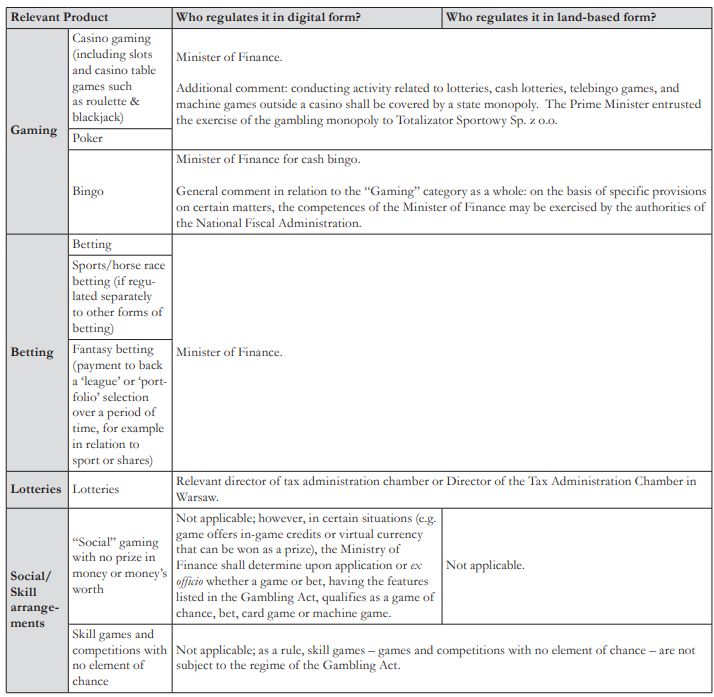1 Relevant Authorities and Legislation
1.1 Which entities regulate what type of gambling and social/skill gaming activity in your jurisdiction?

1.2 Specify: (i) the law and regulation that applies to the Relevant Products in your jurisdiction; and (ii) – in broad terms – whether it permits or prohibits the offer of Relevant Products to persons located in your jurisdiction.
The law and regulation applicable to Relevant Products in Poland is the Act of 19 November 2009 on gambling games (hereinafter "the Gambling Act").
On the basis of the authorisation set out in the Gambling Act, the Minister of Finance issued a number of secondary applicable regulations concerning, for example: issuing certificates of winnings obtained, and records of certificates and records of paid (issued) winnings; manner and extent of archiving data related to online gambling activities; information and communication technology system for recording and archiving data on the progress of games on automatic gaming machines in entertainment arcades; documentation kept by gambling operators; and conditions for providing financial security in gambling activities.
The Gambling Act applies to "gambling games", which consist of four main categories: (i) games of chance; (ii) betting; (iii) card games; and (iv) slot machines games. Games where there is no element of chance (that is, games solely based on the participants' skill or knowledge) are not subject to the Gambling Act, therefore said regulation shall not be considered applicable. However, in certain situations, the Ministry of Finance shall determine upon application or ex officio whether a game or bet, having the features listed in the Gambling Act, qualifies as a game of chance, bet, card game or machine game. Such qualification is made individually, upon the description of the rules of a specific game.
With respect to Relevant Products offered in digital form, pursuant to the Gambling Act, all online games, except for betting and special offer lotteries, are covered by the state monopoly. The only form of online gambling currently permitted for private entities in Poland (upon the licence granted) are betting and special offer lotteries.
With respect to Relevant Products offered in land-based form, the organisation of games of chance, mutual betting, card games and machine games is permitted on the basis of an appropriate licence, permit or notification.
2 Application for a Licence and Licence Restrictions
2.1 What regulatory licences, permits, authorisations or other official approvals (collectively, "Licences") are required for the lawful offer of the Relevant Products to persons located in your jurisdiction?
Upon the provisions of the Gambling Act, there are three types of licences required for offering Relevant Products to Polish residents, i.e.: (i) a licence to run a land-based casino; (ii) a permit to offer betting products; and (iii) a notification on commencement of a licensable activity.
2.2 Where Licences are available, please outline the structure of the relevant licensing regime.
The amendments to the Gambling Act, introduced in 2017, took a restrictive approach. Therefore, the licensing regime in Poland should be described as severe and stiff.
The most significant amendment introduced to the system was a monopoly regime over the majority of gambling games, especially offered online; the only online form allowed to be provided by private operators (upon the permit granted) is mutual betting and/or a promotion lottery.
There is only one legally functioning online casino in Poland, and it is operated by the monopolist – the state-owned company.
2.3 What is the process of applying for a Licence for a Relevant Product?
The licensing process depends on the type of licence sought by the applicant.
In general, the law requires a number of documents, listed in the Gambling Act within the provisions applicable to a given type of Relevant Product, to be provided together with the application form. For example, an application for a licence to operate online betting should, among others, contain: (i) terms and conditions of the game; (ii) draft rules for verifying the age of the participants and prohibiting minors from participating in gambling; (iii) the address and technical documentation of the website used for betting; and (iv) expert opinions on evidence confirming the participants protection against interference by unauthorised persons and the possibility of verifying their authenticity.
The Gambling Act provisions are considered to not offer much guidance as to the content of the documents required. The Gambling Act does not provide any definition of the term "technical documentation of a website". As a general rule, technical documentation shall be of a relatively complete and exhaustive nature. The only general rules on its content were issued by the legislator in the form of informal guidance.
The licensing procedure is considered long-lasting. What is important for foreign operators is that each document, being submitted together with an application, must be translated into Polish by a certified translator. Moreover, if the regulator determines that a given document does not comply with the requirements, the applicant will be requested to provide additional documentation or supplement said document, as well as provide additional clarifications or explanations, particularly in relation to the terms and conditions of the game.
The documents attached to the applications and notifications shall be submitted in the form of originals or copies certified to be true copies of the original by a notary public, advocate, legal adviser or tax adviser.
As of July 2022, applications and tender offers for the granting of a concession or permit by the minister responsible for public finance and documents attached to such applications or tender offers may be submitted in electronic form via the e-concessions ICT system. The condition of access to an account in the e-concessions ICT system is authentication by the user of the account in this system.
As a general rule, the licensing procedure should be completed within six months from the date of filing an application, though the regulator is legally allowed to extend the deadline. In practice, the licence proceedings usually last longer, which should be taken into account by each applicant.
2.4 Are any restrictions placed upon licensees in your jurisdiction?
The Gambling Act provides that licences may be granted on the condition that:
- there are no justified reservations about the given company or its shareholders holding shares whose value exceeds 10% of the share capital of the company, or members of the company's management board, supervisory board or audit committee, or the company's proxies, being natural persons, legal persons or companies without legal personality, concerning state security, public order, the security of economic interests of the state, and compliance with provisions on counteracting money laundering and terrorism financing;
- members of the company's management board, supervisory board or audit committee have Polish citizenship or the citizenship of a Member State of the European Union ("EU"), a Member State of the European Free Trade Association ("EFTA") – a party to the Agreement on the European Economic Area, or the Organisation for Economic Cooperation and Development, with the reservation that this requirement shall not apply to the companies referred to in Article 7a.1 of the Gambling Act (joint-stock companies or limited liability companies, or companies whose activity is based on the principles of operation of a joint-stock company or a limited liability company, having their registered office in another Member State of the EU or Member State of the EFTA – a party to the Agreement on the European Economic Area);
- no proceedings concerning criminal offences related to money laundering and terrorism financing are pending against the persons listed above (item 1) before the judicial authorities of a Member State of the EU or a Member State of the EFTA – a party to the Agreement on the European Economic Area;
- the company has not had a licence or permit revoked for the reason that the conditions provided for in the licence, permit, or the rules, or other legal conditions for pursuing the activities for which the licence or permit had been granted, have been grossly breached within the six years preceding the date of submission of the application for a licence or a permit;
- the shareholders (partners) of the company have not been shareholders (partners) holding shares whose value exceeded 10% of the company's share capital in a company that has had a licence or permit revoked for the reason that the conditions provided for in the licence, permit, or the rules, or other legal conditions for pursuing the activities for which the licence or permit had been granted, have been grossly breached within the six years preceding the date of submission of the application for a licence or a permit; and
- the members of the management board, supervisory board or audit committee or the proxies referred to in item 1 above have not been members of the management board, supervisory board or audit committee or proxies in a company that has had a licence or permit revoked for the reasons that the conditions provided for in the licence, permit, or the rules, or other legal conditions for pursuing the activities for which the licence or permit had been granted, have been grossly breached within the six years preceding the date of submission of the application for a licence or a permit.
To view the full article click here
Originally Published by International Comparative Legal Guide
The content of this article is intended to provide a general guide to the subject matter. Specialist advice should be sought about your specific circumstances.
